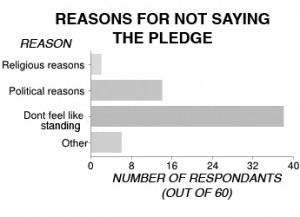

Students in America have been saying the Pledge of Allegiance for years, but if you look around a Townsend Harris classroom on any given day, you might notice some students sitting while the rest of the class stands and pledges to the flag.
A recent poll conducted on the student body reveals that more than half of Harrisites stand and recite the Pledge every single day. However, 45% of the student body have refrained from saying the pledge on at least one occasion while one in ten students abstain from the recitation on a daily basis.
Although refraining from saying the pledge may look like an act of protest to some, the reasoning is far simpler: 63% of those who sometimes or always refrain from saying the pledge do so because they don’t want to get up. The remaining 37% abstain for religious or political reasons.
Senior Alanna Leung, who doesn’t stand for the Pledge, believes that it is “an outdated practice that no longer has any function.” She says that it is something she has “recited blindly” since grade school.
“I’ve seen a huge variety of people who really believe in the Pledge and say it with a lot of feeling every morning, but I’ve also seen people just go along with it ritualistically, or not at all.”
Josh Martinez, junior, said, “We say it so many times it lost its meaning and value, if it had any in the first place.”
Some, however, still see the significance of the oath. Frankie Nicolazzi, sophomore, said, “I stand because I respect my country. I live in this country, and I go to a public school funded by the government. If I didn’t, I’d be taking advantage of something the Pledge gives me.”
Dr. Marianthe Colakis, Classical Languages teacher, believes that those who don’t pledge shouldn’t be singled out, because they might “have legitimate philosophical or religious reasons for not wanting to stand.”
The controversial phrase “under God,” added under President Dwight D. Eisenhower in 1954, has received criticism from some groups because of its religious connotations. Three percent of students who don’t stand refuse to say the pledge for this reason.
Josh continues, “Even though I believe there is a God, it’s disregarding the people who are atheist or who believe in more than one God.”
“I never found it controversial because I’m Catholic,” said junior Alessandra Taboada.
While teachers can’t require students to recite the Pledge, some encourage it out of respect for the American tradition.
“To me, the Pledge of Allegiance is a reminder that although we are ethnically diverse, we are all Americans,” said Dr. Colakis. “There are few rituals that all Americans share, simply because we are so diverse, [and] this is one of the few exceptions.”
This brought up the issue of whether or not students should be required to recite the Pledge. The survey shows that 76% are in opposition to the idea.
Alanna said, “The Pledge itself says ‘with liberty and justice for all’ [and] sitting down for the Pledge is not opposing those principles, but forcing students to say it is.”
Freshman Faheema Syahbal, however, thinks the Pledge should be mandatory. “It’s not hurting anyone,” she explained.
The Pledge of Allegiance was written by Francis Bellamy in 1892, and was officially recognized by Congress in 1942. Although not compulsory, it was meant to instill a sense of structure and patriotism in American students.
This patriotism resides in Jonathan Chung, junior, who occasionally pledges when he wants “to reaffirm [his] American pride.”



























